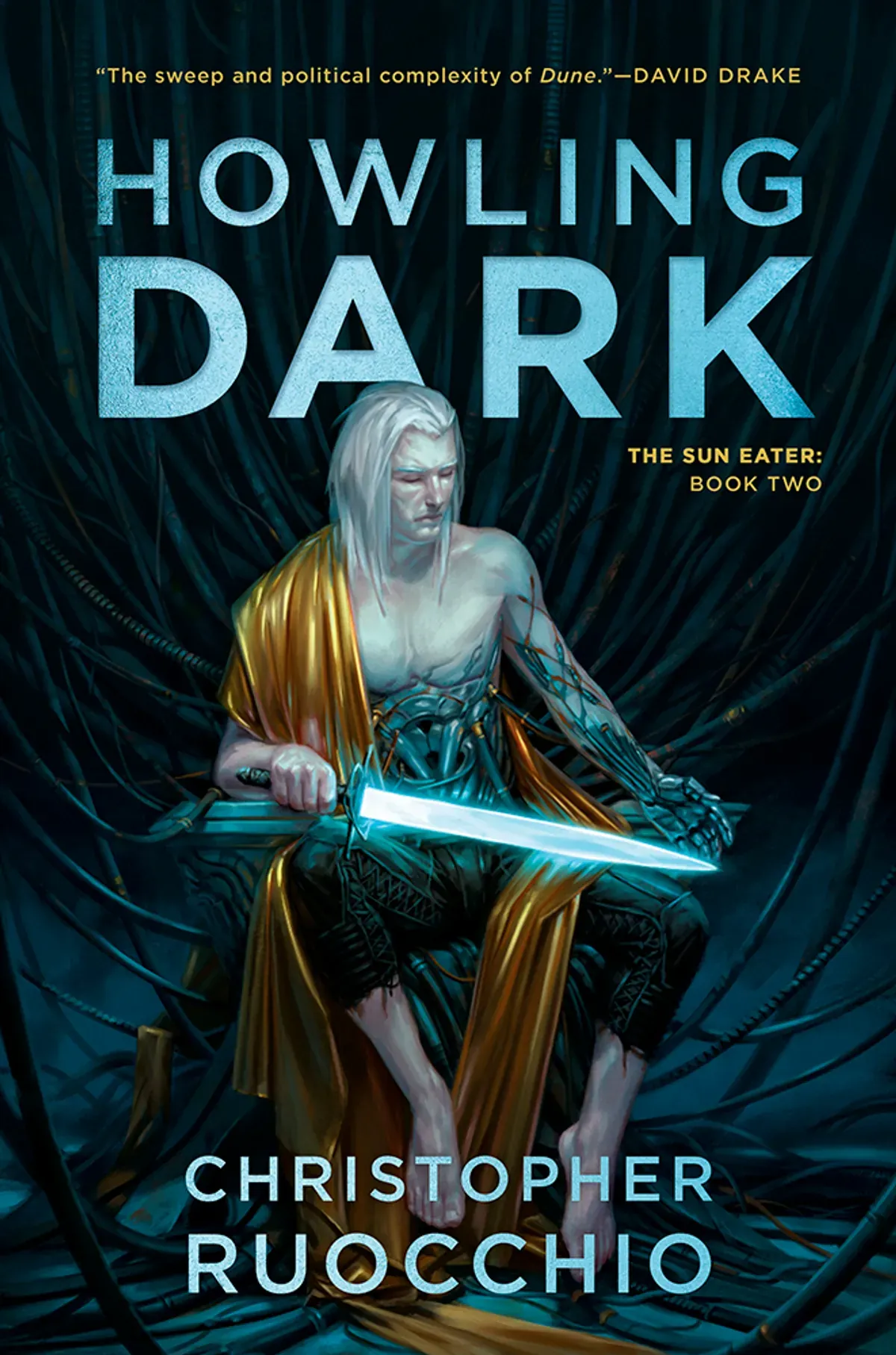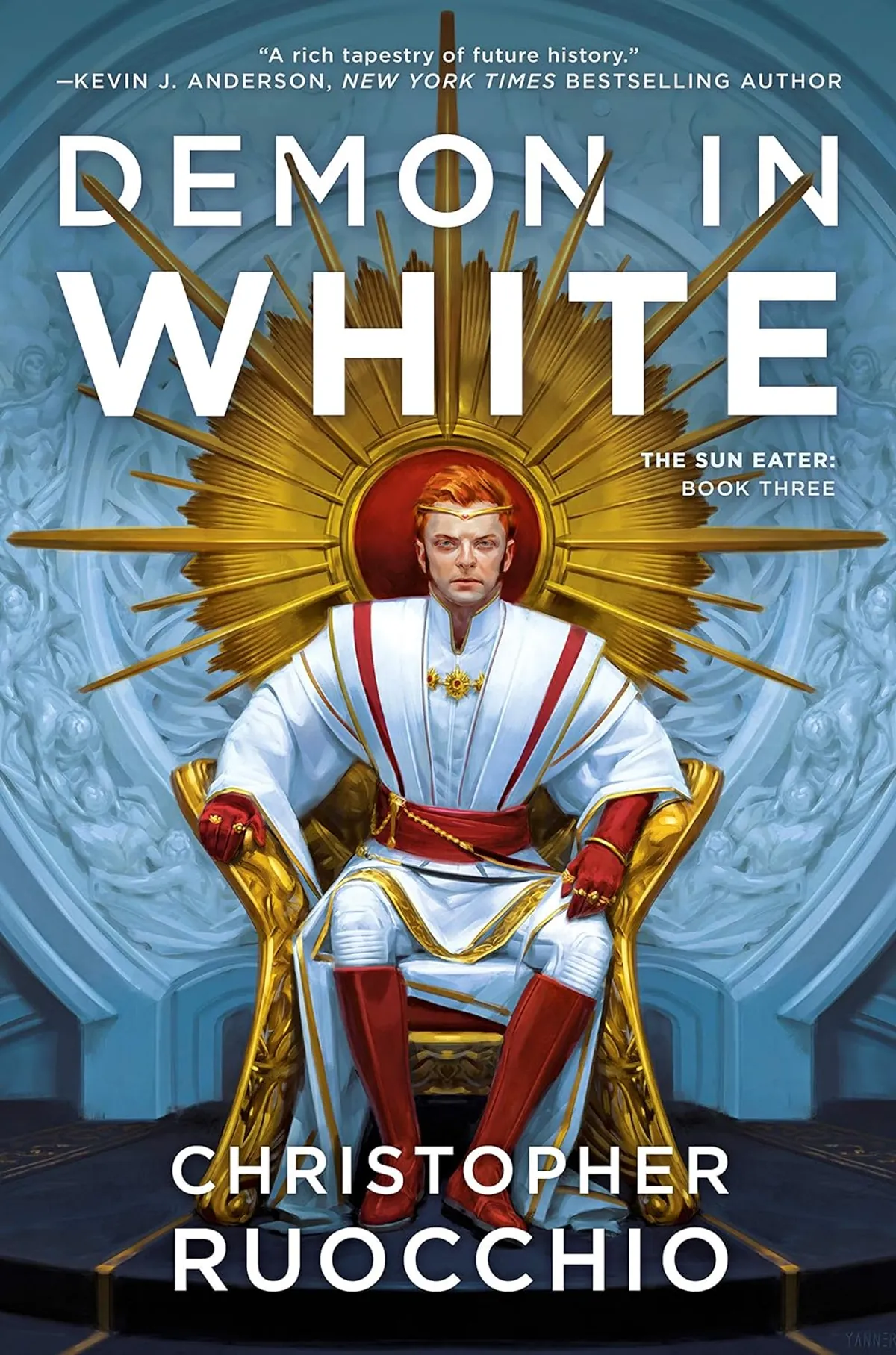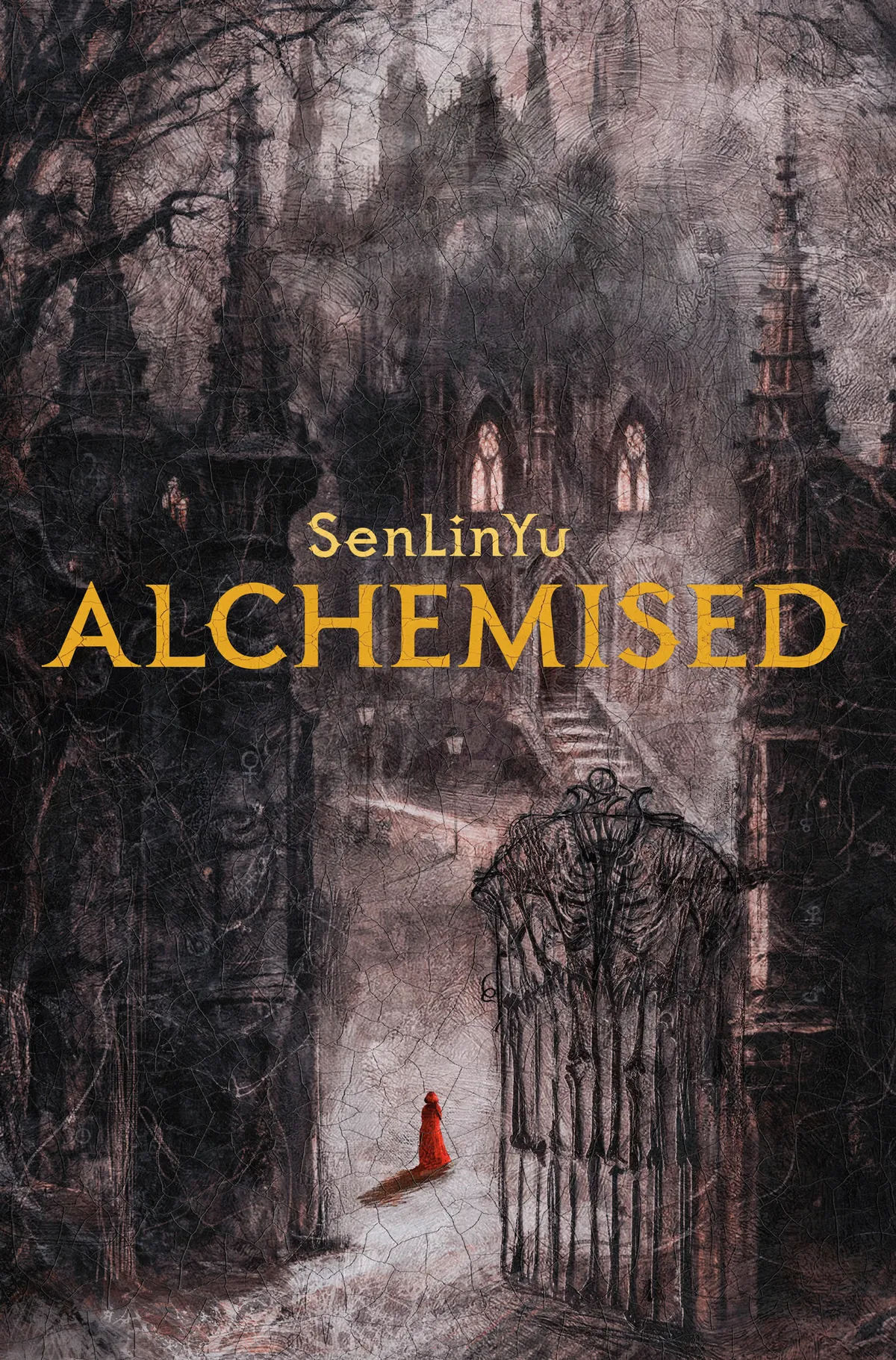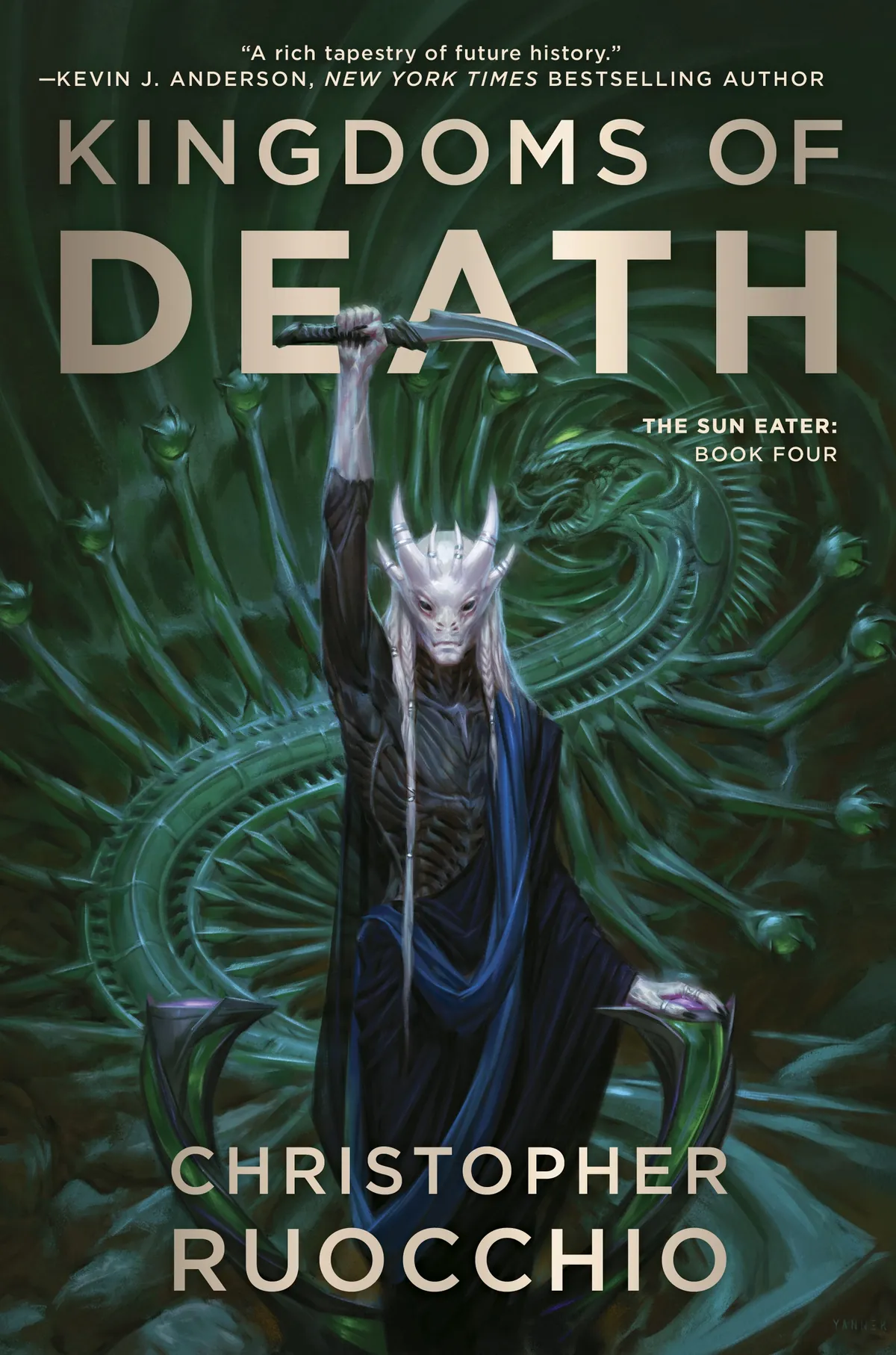Howling Dark
by Christopher Ruocchio
Reviewed by Devin Ford on July 4, 2025
Est. Reading Time: 13 min

Quick Info
Title: Howling Dark
Author: Christopher Ruocchio
Series: The Sun Eater (Book 2)
Published: July 16, 2019
ISBN-13: 9780756413033
At a Glance: Where Legends Are Truly Born
Howling Dark doesn’t just live up to the promise of Empire of Silence, it destroys every expectation and delivers something genuinely astonishing. Christopher Ruocchio takes every single element that worked in book one, and makes it even better, and doesn’t stop there. The author accomplishes tasks that most writers lack the courage to undertake. Hadrian Marlowe’s epic legend begins in this work which establishes the Sun Eater series as one of space opera’s greatest achievements.
Half a century after the events of Empire of Silence, Hadrian has spent the last five decades scouring the furthest corners of the galaxy for the lost planet of Vorgossos, in an attempt to contact the alien Cielcin and establish a peace treaty. As the captain of the mercenary company the Red Company, he’s followed thousands of leads deep among the barbarian Norman tribes outside the borders of the Empire. His hunt for peace will take him to places darker and more dangerous than he’s ever been before and force him to question not just his alien enemies, but the very nature of humanity.
The primary difference between Howling Dark and its predecessor is just how strange and terrifying it is willing to be. While Empire of Silence was a story of self-discovery taking place within the familiar structure of Imperial society, Howling Dark expands its scope to include the cosmic unknown and the universe beyond. A universe far larger, and far more horrific, than previously believed.
Beyond the Empire: A Universe Revealed
Ruocchio continues to expand the world-building to some of its best yet in Howling Dark. The space beyond the Sollan Empire’s structured control has always held the potential for fascinating exploration, but Howling Dark introduces entire new sub-sections of this already expansive world. The Extrasolarians who reside in the space between stars are an intriguing multi-faceted concept, exiles or refugees from the Sollan Empire and wildly different takes on humanity’s potential future.
Vorgossos is one of science fiction’s most recognizable and unsettling places to read about. Without getting too spoiler-y, the way Ruocchio approaches the atmosphere of the planet is a mix of Lovecraftian and Socratic cosmic horror with some beautiful world-building hiding behind what is effectively a facade of awe and existential terror. The atmosphere is claustrophobic and isolating, yet intimate and epic at the same time.
One of the most interesting concepts to see expanded on is the Cielcin culture. They’re not just aliens that the heroes need to fight or side characters that are another form of life. They’re a completely foreign species, and their thought-processes and culture feel extremely authentic to their own very non-human way of thinking. In Cielcin language there exists no word to express peace but only one for submission making peace seem like an entirely unfamiliar concept.
Ruocchio uses the gaps in language and cultural understanding to explore ideas about xenophobia, cultural relativity, and the idea of peace between completely different and perhaps even incompatible forms of life.
Ruocchio also continues to use technology that blurs the line between science and magic. Ancient AI systems, devices that bend reality, and biotechnology that questions what it even means to be human all have a role to play in the narrative and world-building. Kharn Sagara, the world’s most enigmatic character, has persisted for over fifteen millennia through a cloning and memory transfer process.
Character Evolution: Hadrian’s Moral Complexity
Howling Dark is the story of Hadrian Marlowe at his most compelling. The brash and idealistic young nobleman from Empire of Silence has become a battle-scarred leader with heavy burdens and impossible choices. Ruocchio beautifully balances his internal conflict between the ideals he was raised with and the unforgiving pragmatism that is necessary to stay alive.
His moral ideals still orient him towards peace and justice, but they exist in a universe where those concepts are more complicated than he ever thought they could be. His burgeoning relationship with Jinan provides needed emotional counterpoints and his relationship with Valka deepens in believable and earned ways. The slow-burn romance aspects never dominate but they are important emotional anchors for a character who is increasingly isolated by his exceptional situation.
The supporting cast is fantastic in this novel. Bassander Lin is an absolute standout, a man whose devotion to the Empire makes him an antagonist and whose steadfast devotion to duty is both admirable and sets him on an inevitable collision course with Hadrian’s independent moral code. The character Switch reveals intriguing development because his bond with Hadrian strengthens through surprising means and his depth increases. I loved that he felt like a real person and not a trope.
Valka also has a larger role in this novel and I love her as a character and her take on the world. Her scientific lens provides a great counterpoint to the more mystical and religious aspects that keep cropping up in Hadrian’s life and her xenobiological insights are critical to understanding the Cielcin and other more alien entities.
New characters like Kharn Sagara have a mythic quality, like these are characters that have been around for ages, that have lived thousands of years and carry all of the wisdom and depravity of that life experience with them. Their presence in the story feels like it points to something more expansive. Hadrian remains unaware that he belongs to an epic saga that extends throughout several millennia of human exploration beyond Earth.
Relentless Momentum: Pacing Perfection
In many ways, Howling Dark moves at a much quicker pace than Empire of Silence and while some elements of the latter were still lingering at times, this one is breakneck. Each scene drives the overall plot forward and each revelation recasts what has come before.
The novel is also a masterclass in ebb and flow. There are quiet scenes between old friends, and they have as much significance as space battles and the like. Because the author has set the stage in such a way that stakes are high for all characters, everything has significance. When there is violence, and there is plenty, it is intense and hard-hitting, but it never feels like it is there for the sake of violence. Everything in this book has a reason to be there.
In many ways, it was the horror that I found most remarkable in this one. The author excels at an air of foreboding and dread without needing to go in for gore or visceral scares. The philosophical horror explores how our definition of humanity changes when human identity reaches its limits. What does it mean to find peace when working with species that do not have an understanding of the word? What is an acceptable price for “the greater good”?
The thriller elements make this one a page turner as well. There are these nebulous prophecies and conspiracies that go back millennia, and there is no sense of security in any of this. Nothing is sacred. Hands down the creepiest moment was the nursery rhyme sequence, a childhood rhyme with it’s elements twisted into a genuine sense of unease that truly highlights the horrors of Vorgossos.
Between the Sheets: Character Bonds Over Romance
BroMantasy Spice Rating
Barely There
(Chaste Romance)
The romance in Howling Dark is not particularly spicy at all, meriting only a 🌶️ (1.0) on our scale. It would be easy to crank up the heat factor here, but the relationships Hadrian has with both Jinan and Valka feel like a natural progression from time spent together and mutual respect rather than a contrived sense of tension.
The romantic subplot achieves authenticity since both characters closely encounter death and fully grasp their shared mission’s importance. This isn’t a situation with hormonal teenagers because both Hadrian and Valka and Hadrian and Jinan represent mature adults who maintain intimate partnerships during their space mission while also fighting to preserve civilization.
Ruocchio does an excellent job of balancing the different relationships Hadrian has with Valka and Jinan here. Rather than using overly melodramatic situations to ratchet up conflict, the emotional intimacy and romantic elements of the story are both balanced and complementary to the weight of the central plotline.
Bro Reading Comfort: Space Opera Excellence
Rated 😳 (1.0) for comfort, this is by no means unsuitable for public reading. The core themes of military strategy and political maneuvering alongside space conflicts and philosophical inquiry remain unchanged because they are as easily understood as any genre.
Cover design remains consistently focused on the series’ aesthetic, and the text has everything that I’ve come to expect from space opera: epic scale, strategic maneuvering, and larger than- ife characters being asked to do the impossible. The story seamlessly blends its interpersonal relationship components making it qualify as a subdued romance despite intentions to keep romance minimal.
Darkness Factor: The Weight of Doing the Right Thing
Howling Dark’s 💀💀💀💀 (4.0) darkness rating is a fair measure of the fact that Ruocchio was not afraid to take his universe to some dark places in service of his themes, but he is never needlessly grimdark. The horror elements have thematic purposes as the story explores what happens when humanity is pushed to its limits or beyond.
The violence in Howling Dark has emotional resonance because all of the conflict matters. Deaths are meaningful, betrayals haunt the characters, and victories are won with losses that make you and the characters wonder if it was worth it. The psychological darkness is often more powerful than the physical violence as characters are faced with making hard moral choices that don’t have easy answers.
The cosmic horror elements are effective because they are firmly grounded in the relationships between the characters. Alien AIs from the dawn of time whispering foreboding secrets are scary not because they are themselves horrifying, but because of how they impact characters that we care about. The darkness comes from watching good people do bad things and live with the fallout.
The elements of mystery surrounding the Quiet and the ancient technologies drive an existential dread that hangs over the entire narrative. This isn’t horror for the sake of being horrific, but horror as a natural result of the characters exploring a universe that functions according to rules that the characters (and the readers) don’t fully understand.
Book Battlefield: Another Genre Defining Space Opera
Howling Dark is the type of space opera that makes you know what the best in the genre can do. For our reference point of a 5-star space opera, we use Golden Son, so we’ll judge Howling Dark against its equal, though not the same. Golden Son is a book that soars in the political intrigue and worldbuilding, so Howling Dark excels on the cosmic horror and weird philosophy that doesn’t quite transcend its influences, but it feels like it.
The book is the rare sort that works in so many ways; it scales the universe and deepens characterization at the same time, it adds new ideas while paying off set-ups in the first book, and it is both series-continuity-building while telling a satisfying story in its own right. Like Golden Son, Howling Dark takes everything that works in the first book and layers it on thicker, but with new elements that don’t feel forced or tacked on.
These space opera books demonstrate dual functionality within their genre as they provide both an accessible surface reading experience and opportunities for deep analysis through their hidden meanings and references.
The heavy influences of the classic sci-fi giants are as present as they are invisible, and never does it feel derivative or used in a way that marks Ruocchio a pale imitator. Rather, he takes the elements that have worked in the genre’s past, and channels them together with his own unique sensibility. The book is as much a mix of the familiar and the revolutionary as Golden Son was in that respect.
Should You Bother?
For fans of space opera: You need to read this. Howling Dark is what this kind of story can be when every element is working in concert. The scope, the politics, the tech and the characters all build to something larger, and it is the best that the genre has to offer.
For fans of horror: The cosmic horror on display is genuinely terrifying, and not just because of the slime and screaming. The philosophical horror may even be better than the visceral.
For those that love amazing character work: For all the epic scope, this is a story about people and all the terrible choices they make under pressure. The character work is spot on.
For a great book, period: I said it once and I’ll say it again. Sometimes a book just transcends genre and is just a great book. This is one of those books.
Final BroMantasy Verdict
Howling Dark deserves its perfect 5.0 rating because it not only exceeds an already very high bar set by others in the genre, it stands as one of those rare essential books that every fan of outstanding sci-fi should read. This book is rare because it is improving on an already well definied genre filled with classics, while also raising the stakes and the scale in a way that is both unexpected and inevitable. Every aspect of craft (character, worldbuilding, pacing, prose, themes, etc) is at the level of excellence that most authors spend a lifetime chasing. Not only that, but it is all done with a consistently exceptional quality level that stands out as exceedingly rare.
I agonized over this score for a while, because I gave Golden Son a 5.0 and stated in the review that it redefined space opera. I kept thinking if I had read this first, would I have rated it a 5.0? In the end the answer is yes, and I don’t believe I should hold it to a higher standard than I would any other work, and this in my opinion is one of the best space operas I’ve ever read.
Technical excellence, however, is not enough for a five-star rating. This book is in a category of its own because it earns every second of its excellence while also managing to be epic and intimate, adventurous and thoughtful, entertaining and meaningful. The questions it asks about humanity, peace, war, and identity feel real and complex, with no easy answers and no simple moralizing. Nothing feels like it is thrown in for shock value or just because it can be. Every emotional moment lands because the foundation has been properly built. Every plot twist and surprise is shocking while still feeling inevitable because the groundwork has been properly seeded.
Howling Dark works as intimate character study and epic space opera, as philosophical and as entertainment, as horror masterpiece and military sci-fi, as political thriller and romantic adventure. That kind of breadth of excellence is what differentiates good books from great books, great books from perfect books. It delivers on every promise of its setup while also building up to even more enormous stakes for the future, providing emotional catharsis while still building forward momentum. Howling Dark proves that space operas can achieve all literary fiction does while delivering sci-fi’s unique sense of wonder and excitement.
This is why Howling Dark gets one of the very few perfect ratings on this site. This is a book that not only excels at what it is, it transcends the confines of genre to become simply essential reading. If you read one space opera sequel in your life, make this one. If you read a hundred space opera sequels in your life, this one will stand out from the pack.
The Sun Eater series was already on its way to being promising. Howling Dark makes it legendary. The science fiction universe is a better place for its existence, and any reader lucky enough to stumble upon it is in for one of the best experiences around!
You Might Also Enjoy
Frequently Asked Questions
Is this book part of a series?
Yes, this is book 2 in the The Sun Eater series.
How spicy is the romance?
We rate the spice level at 🌶️ (1/5). Soft romantic themes that inform the character journey but never take over the story
How uncomfortable is it to read in public?
We rate the public reading discomfort level at 😳 (1/5). Action heavy with little to no content issues, suitable for reading anywhere
How dark are the themes in this book?
We rate the darkness level at 💀💀💀💀 (4/5). The story depicts a world filled with substantial darkness alongside horror aspects while exploring complicated moral choices during wartime conditions.
What age group is this book for?
This book is generally recommended for adult readers due to its mature themes. We recommend checking specific content warnings if you are sensitive to certain topics.





